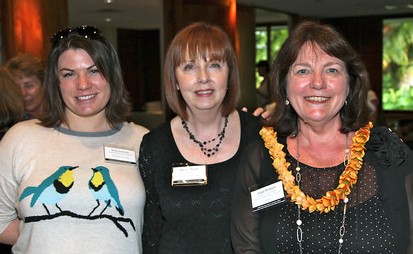UH Manoa Nursing Dean’s Lecture 2014 Featured AARP’s Senior Vice President Susan Reinhard
Nursing and healthcare professionals with faculty and students gathered at the Pacific Club on Tuesday, February 25, 2014, to hear Susan Reinhard, PhD, RN, Senior Vice President of AARP and Director of the AARP Public Policy Institute speak about “Complex Chronic Care and Family Caregivers,” which detailed groundbreaking research on the complexity of medical tasks performed by family caregivers.
 The findings of this study challenge the common perception that family caregiving is limited to personal care and household chores. Dr. Reinhard shared high-level findings on the dramatically expanding role of family caregivers, who are found to be routinely performing medical and nursing tasks customarily provided by healthcare professionals.
The findings of this study challenge the common perception that family caregiving is limited to personal care and household chores. Dr. Reinhard shared high-level findings on the dramatically expanding role of family caregivers, who are found to be routinely performing medical and nursing tasks customarily provided by healthcare professionals.
The nation-wide survey titled “Home Alone: Family Caregivers Providing Complex Chronic Care,” gathered information from 1,677 family caregivers to determine what medical and nursing tasks they actually perform and their comfort and training levels in executing these tasks.
The full survey was conducted by Dr. Reinhard and; Carol Levine, MA, Director of the Families and Health Care Project, United Hospital Fund; and Sarah Samis, MPA and Senior Health Policy Analyst, United Hospital Fund.
The study’s findings included:
- Almost half (46%) of family caregivers performed medical/nursing tasks for care recipients with multiple chronic physical and cognitive conditions.
- Many family caregivers managed a variety of medications, and learned how to manage these medications largely on their own.
- Caregivers found wound care particularly challenging and many wanted more training in this area.
- Family caregivers reported both positive and negative effects on their own quality of life. Positive effects included satisfaction in making an important family contribution in preventing nursing home placement, and negative included less time for their own needs, and stress and worry in making a mistake while preforming the various medical/nursing tasks.
Reinhard said that in Hawaii, there is an especially high number of elderly population who are being cared for by their family members.
 Major recommendations from the study included a reassessment of the way healthcare providers and professionals interact with family caregivers in daily practice and increased support for caregivers’ efforts by providing training and referrals to existing resources. Also, policymakers should proactively consider family caregivers in developing new models of care and in funding programs.
Major recommendations from the study included a reassessment of the way healthcare providers and professionals interact with family caregivers in daily practice and increased support for caregivers’ efforts by providing training and referrals to existing resources. Also, policymakers should proactively consider family caregivers in developing new models of care and in funding programs.
Following the lecture, guests enjoyed camaraderie and pupus in the Pacific Club Card Room and courtyard.
The UHM Nursing Dean’s Lecture is made possible by the generosity of Charlie and Preston Fox, who established the “Starlit Walk Present: Endowment for Advancement of Nursing,” a fund to bring nationally renowned speakers to Hawaii to educate students, alumni, and nursing and other healthcare professionals.
